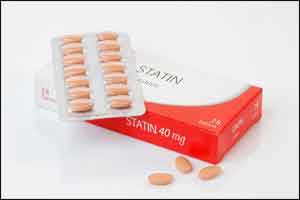- Home
- Editorial
- News
- Practice Guidelines
- Anesthesiology Guidelines
- Cancer Guidelines
- Cardiac Sciences Guidelines
- Critical Care Guidelines
- Dentistry Guidelines
- Dermatology Guidelines
- Diabetes and Endo Guidelines
- Diagnostics Guidelines
- ENT Guidelines
- Featured Practice Guidelines
- Gastroenterology Guidelines
- Geriatrics Guidelines
- Medicine Guidelines
- Nephrology Guidelines
- Neurosciences Guidelines
- Obs and Gynae Guidelines
- Ophthalmology Guidelines
- Orthopaedics Guidelines
- Paediatrics Guidelines
- Psychiatry Guidelines
- Pulmonology Guidelines
- Radiology Guidelines
- Surgery Guidelines
- Urology Guidelines
MI and stroke patients on statins have better outcomes

Patients with a prior history of heart attacks or stroke have better outcomes when cholesterol-lowering medications are used after they're discharged from the hospital, according to a new study from the Intermountain Medical Center Heart Institute in Salt Lake City.
Prior surveys in hospitals found that statins, a common medication prescribed to lower cholesterol, aren't being used as consistently in patients who've been admitted to the hospital following a heart attack or stroke. Researchers also found that when the medication is prescribed, dosing is likely not as high as it should be to provide optimal benefits.
Researchers from the Intermountain Medical Center Heart Institute examined more than 62,000 records of patients from the Intermountain Healthcare system between 1999 and 2013 who survived an initial atherosclerotic cardiovascular disease event, such as a heart attack or stroke. They were then followed for three years, or until death, to identify the effectiveness of statin use prescribed at the time of their discharge.
"Patients who were prescribed a statin medication following an initial heart attack or stroke reduced their risk of a future adverse event such as a future heart attack, stroke, revascularization, or death, by almost 25% -- the rate dropped from 34 percent to 26 percent," said Jeffrey L. Anderson, MD, cardiovascular researcher at the Intermountain Medical Center Heart Institute. "The patients who were discharged on what's considered a high-intensity dose of a statin saw a 21 percent reduction in their risk than those discharged on a low-intensity statin dose."
Results of the study will be reported at the 2017 American Heart Association Scientific Sessions in Anaheim, CA, on November 13, at 11:30 a.m., PST.
People with high cholesterol face an increased risk of heart attack, stroke, or other forms of heart disease. Statins are medications used to help lower cholesterol levels in the blood, thus reducing a person's risk of cardiovascular injury or death.
Intermountain Medical Center Heart Institute researchers found that 30 percent of patients in the study who were discharged from the hospital following a heart attack or stroke wasn't prescribed a statin, which led to worse outcomes for those patients.
Researchers also found that only 13 percent of patients were given a high-intensity dose of statins - but noted that patients on those higher doses experienced fewer heart attacks or strokes. For those under 76 years of age, a high-intensity statin is indicated by American Heart Association guidelines, yet only 17.7 percent of these patients in the study were discharged on a high-intensity dose.
"In a real-world clinical setting, we noted that patients who'd just experienced a major cardiovascular event weren't always prescribed a statin, and others didn't have doses that were high enough to provide optimal outcomes," said Dr. Anderson. "The key takeaway for clinicians and patients is that statins work, and routinely prescribing a statin and the optimal dose for the patient will help improve outcomes by lowering risk of a repeat heart attack, stroke or revascularization procedure such as a stent or bypass surgery."

Disclaimer: This site is primarily intended for healthcare professionals. Any content/information on this website does not replace the advice of medical and/or health professionals and should not be construed as medical/diagnostic advice/endorsement or prescription. Use of this site is subject to our terms of use, privacy policy, advertisement policy. © 2020 Minerva Medical Treatment Pvt Ltd